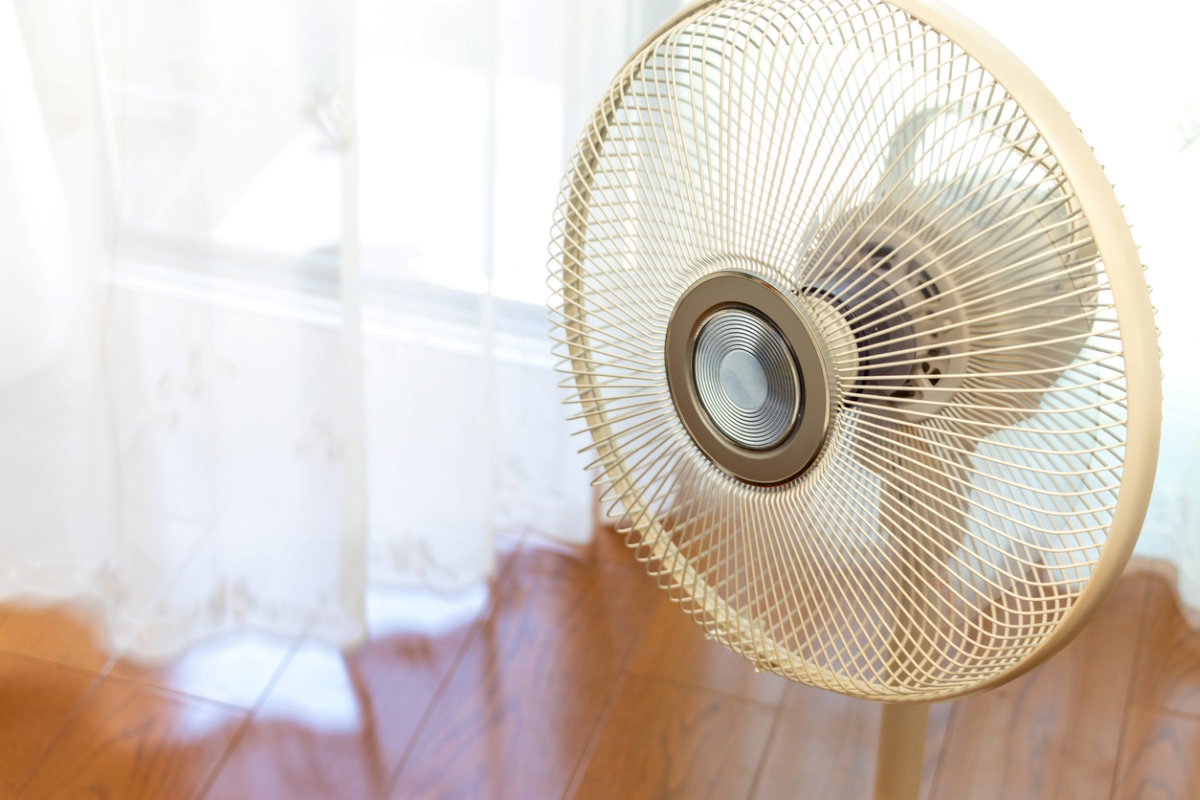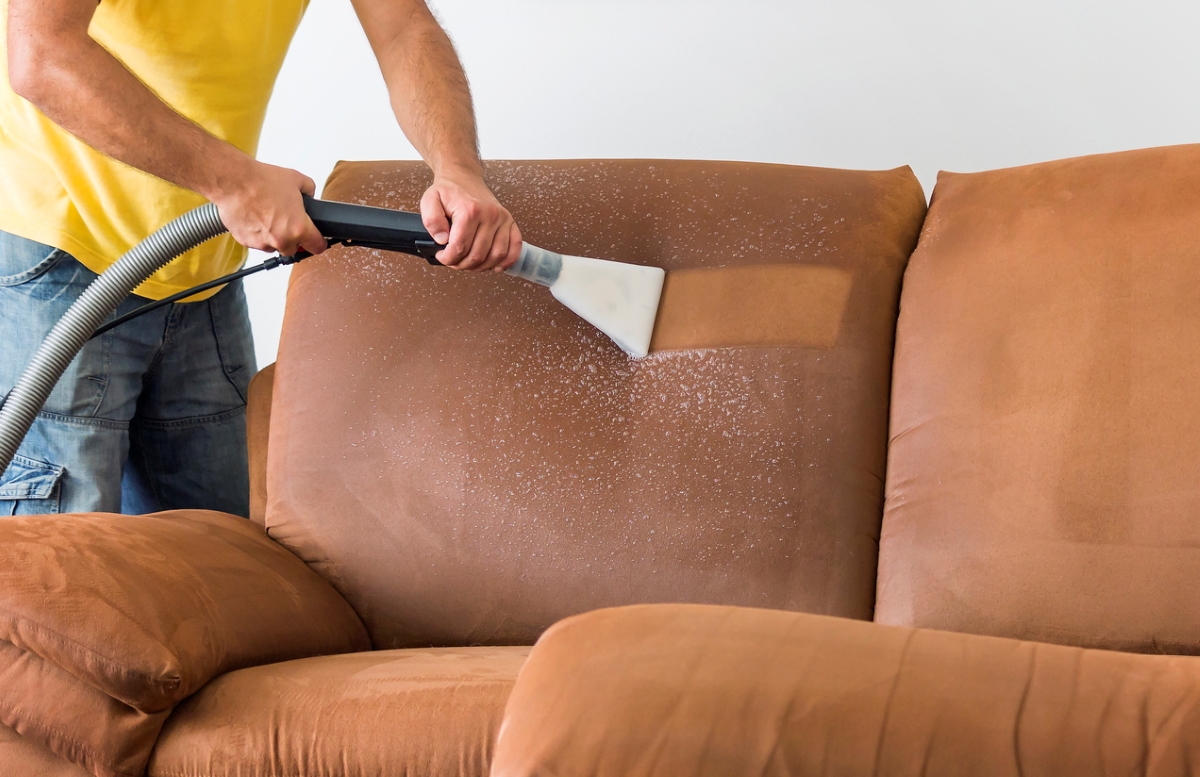

We may earn revenue from the products available on this page and participate in affiliate programs. Learn More ›
Q: I recently inherited a beautiful chair from my grandparents. Unfortunately, they were heavy smokers, and the cigarette smell has permeated the upholstery. Is there any hope for my heirloom, or is smoke smell removal just wishful thinking?
A: As a cigarette smolders, it produces smoke molecules encapsulated in microscopic bits of oil and tar, which adhere stubbornly wherever they land. As a result, cigarette smoke clings tenaciously to furniture, clothing, and the very walls, floors, and ceilings of a house that once belonged to a heavy smoker. Smoky smells in general—not just cigarette smoke—tend to stick around for a while. Whether the source of the smell is a nearby wildfire or an unfortunate cooking accident, the smoky evidence will linger. You can try to mask the unpleasant smell with scented candles or dilute it by opening a few windows, but until you get to the source, the stench will persist.
A commercial air freshener can effectively tackle mild cases of smoky smells, but these sprays merely mask odor, rather than absorb or neutralize it. When items have been repeatedly exposed to smoke for years, the smell is bound to return after the air freshener wears off. (Note: While the chemical ingredients in these products are generally safe for you and your cats and dogs, they’re harmful to birds—do not use if you have feathered pets.) For you to be able to keep your armchair, masking the odor isn’t enough. This job requires smoke smell removal.
The smoke removal strategies that follow use a variety of approaches and include several all-natural solutions for your stinky stuff. While these methods were collected with smoky situations in mind, they would also work on any number of other odors. You might have to try a few of these before you figure out how to get rid of the smell of smoke in your home, but if you have patience, you’re sure to greatly reduce, and perhaps totally eliminate, the persistent smoky smell.
10 Tried-and-True Tips for Smoke Smell Removal
You have a variety of tools at your disposal for eradicating smoke smells. Some of these ideas for how to remove smoke smell from the house are best for clearing smoke from the air, while others help eliminate odors from upholstery, carpeting, and walls. Depending on the source of the odor, you’ll probably need to employ several of the solutions below to remove all the smoke smells from your home or car.
1. Air out your space.

Don’t discount the power of fresh air as a smoke odor eliminator! Use nature as a weapon in your fight against smoky smells by following these steps:
- Open all the windows and place a fan or two in front of the largest ones, with the blades blowing outward, to pull smoky air from the room and aid in cigarette smoke removal. Keep this up for a full day, if possible.
- Set smoke-ridden furniture, books, and clothing outside in a sunny spot for several hours—those UV rays can help neutralize odors. Note that intense sunlight can damage or fade delicate or dyed fabrics, so if it’s very bright and hot out, air that smoke-plagued vintage shawl or embroidered pillow in a shady spot.
RELATED: Clear the Air: 10 Natural Ways to Cure Household Odors
2. Sop up the smoke smell with baking soda.
Sodium bicarbonate, or baking soda, is a very effective deodorizer, as it actually absorbs smells rather than merely masking them. Here are a few ways it can freshen your space:
- To remove smoke smell from a car or room, fill several small bowls with baking soda and set them all around the space. Leave the baking soda in place for at least 24 hours.
- Sprinkle a thin layer of baking soda onto rugs or carpeting, let it sit for at least 2 hours (preferably overnight), and then vacuum.
- Sprinkle a smelly sofa or upholstered chair with a light coating of baking soda, let it sit for a minimum of 2 hours, and then thoroughly vacuum it with an upholstery attachment.
- For books, small decorative items, and clothing that isn’t easily washable, pour 1/2 cup of baking soda into a large plastic trash bag, add the smoke-damaged items, and then tie the bag shut. Give your belongings a good 8 hours inside the bag before removing them and dusting or shaking off the powder.
3. Neutralize smoke smell with a vinegar wash.

White vinegar is another nontoxic household staple that works to neutralize, not mask, bad odors such as smoke. Its low pH “attacks” the higher-pH smoke molecules, altering them just enough to reduce their smell. Don’t worry, the smell of vinegar itself will naturally dissipate once it dries or is removed.
- To remove car smoke smell, or reduce a stale smoke odor indoors, fill several small bowls with white vinegar, set them around the space, and let them sit overnight.
- To speed up the process of deodorizing your home’s interior, boil a potful of vinegar on the stove, and let it simmer for an hour or two. As the steam wafts through the air, it helps to remove the smoke smell.
- If you want to learn how to get smoke smell out of clothes, here’s the scoop: Smoke-ridden, machine-washable clothing can be tossed into the laundry along with ½ cup of white vinegar rather than laundry detergent. The acidic vinegar will help break down the malodorous molecules. Laundry detergent, which tends to lean toward the alkaline end of the pH scale, as does cigarette smoke, won’t neutralize the odor as effectively.
4. Put out bags or bowls of activated charcoal.
The carbon molecules in charcoal chemically “trap” smells, clearing them from the air. While grilling briquettes can be used in a pinch, activated charcoal is processed for better porosity and absorption power (and isn’t treated with flammable chemicals). Most home improvement centers carry a range of activated charcoal products that are marketed as smoke or odor eliminators. While activated charcoal is often packaged in small fabric bags, it’s also sold in larger containers that can then be used to fill up bags or bowls.
Place several bags or bowls of activated charcoal around a smoky room or car to absorb odors, or place the bags atop smoke-damaged furniture or carpeting. Don’t set unbagged activated charcoal directly on fabric, however. It can leave a stain.
RELATED: Does Your Home Smell Funny? 12 Odors That Could Mean Big Trouble
5. Steam away the smoke smell.
Steam cleaning can be especially effective on smoky walls, floors, and upholstery. The heat melts the hardened tar and oils that encapsulate the smoke molecules, making it easy to wipe them away with a microfiber cloth or sponge.
Many home improvement centers rent steam cleaners, typically for about $25 per hour, or you can purchase one. Prices range from about $80 to $150, with machines at the higher end offering greater water tank capacity, more features, and a wider variety of accessories. An option worth considering is the Pure Enrichment PureClean Steam Cleaner, rated Best Overall in our guide to the best steam cleaners.
Steam cleaners are easy to use: Just mist surfaces lightly with the heated vapor, keeping the steam cleaner’s head moving at all times to avoid saturating any one area. Oversaturating with steam can harm delicate fabrics such as silk, and even damage drywall.
6. Use a dehumidifier.

Dehumidifiers aren’t just effective at removing moisture from the air. They can also help get rid of foul smells. Because odors linger longer in heavier air, using a dehumidifier to dry out the air can help to eliminate the smell. Many dehumidifiers also have built-in filters that remove contaminants such as pollen, dust, and, yes, cigarette smoke. Just remember that eliminating odors is not a dehumidifier’s primary function. It will need to cycle the air in the room multiple times to have much of an effect, and it won’t remove smoky smells from surfaces and furniture.
RELATED: The Best Dehumidifiers for the Home, Tested
7. Invest in an air purifier.
Air purifiers offer mixed results when it comes to removing the smell of tobacco smoke. Because many air purifiers are designed to collect particulate matter, they are ineffective against gaseous pollutants, which are what cigarette smoking creates. Some air purifiers, however, specifically those that use charcoal filters, might be more effective. Look for an air purifier with a charcoal filter (sometimes referred to as an activated carbon filter) if you’re trying to get rid of the acrid odor of cigarette smoke.
If, however, you’re in a fire-prone area and wildfire smoke is what you’re trying to remove, an air purifier with a high-efficiency particulate arrestance (HEPA) filter might do the trick.
8. Change your HVAC air filters regularly.
While your HVAC system’s air filters won’t remove all of the pollutants that cause smoke odors, they’re an important part of a comprehensive strategy for figuring out how to get rid of smoke smell in a house, especially if they’re used in conjunction with the tactics listed above. Set reminders so you’re certain to change your air filters regularly. Many experts recommend changing them quarterly, although if you’re battling cigarette smoke, pet hair, or other ongoing pollutants, changing the filters more often is advised.
An HVAC system armed with HEPA filters can be a valuable ally in the quest to eliminate smoky smells, but not all AC systems can accommodate HEPA filters. Because your system’s airflow might not be powerful enough to push through the denser HEPA filters, it’s important to consult experts before taking this step. Talk to your HVAC service team about whether installing HEPA filters in your system makes sense.
RELATED: 5 Easy Ways to Improve Kitchen Ventilation
9. Deep clean your upholstered furniture.

Smoke has microscopic particles that easily penetrate fabrics, including the porous upholstery on furniture, and this makes eliminating smoke smells from furniture difficult. You’ll need to attack these particles with a deep cleaning.
First, remove any washable slipcovers and throw pillows and launder them according to the manufacturer’s instructions. (Use vinegar for best results.) Then get to work on those parts of your upholstered pieces that can’t just be tossed in the machine. If they can be steam cleaned (check your furniture’s care label), rent or buy a steam cleaner and give the upholstered surfaces a thorough going over.
Sprinkle baking soda over any upholstered pieces that can’t be steam cleaned or washed. Be sure to remove sofa cushions so you can scatter baking soda on the seat below. Let the baking soda sit for at least 2 hours, and then vacuum it up using an upholstery attachment.
As we’ve already suggested, you can also place the cushions—or even an entire chair or sofa—outside, where the UV rays and fresh air can help eradicate the smoky smell. If that’s not possible, set up fans to ventilate the room and circulate air around the furniture.
RELATED: How Much Does Upholstery Cleaning Cost?
10. Spray odor-reducing products.
Many sprays merely mask foul odors with other scents, but some can actually help minimize smoke odors. Unless you’re after a smoky lavender or pine forest fire aroma in your home or car, you’ll need to use a spray that can neutralize the odor.
Unlike sprays that just cover up the bad smells, these products capture the odor molecules and remove them from the air or upholstery. Zep Commercial Smoke Odor Eliminator is effective at removing smoke smells from the air, while Zero Odor takes the smoke smell off upholstery, drapes, carpeting, and walls.
How to Prevent Smoke Smells in Your House

The best way to avoid having smoke smells in your home is to ban indoor smoking. If that’s not an option, there are other ways to prevent smoke odors from taking over your home.
- Smoke outdoors or near an open window. Though this strategy won’t entirely eliminate the smell of smoke in your home, it will dramatically reduce it by allowing much of the smoke to escape outdoors.
- Turn on an air purifier. Running an air purifier while you’re smoking will help trap smoke particles before they can find their way onto furniture, carpeting, and other surfaces.
- Close windows before lighting the grill or fire pit. If you’re having a backyard barbecue or lighting up the fire pit, close windows and doors to prevent the smoke from wafting indoors.
- Don’t smoke near an HVAC return. The HVAC returns in your home suck in air, send it to your air conditioner or furnace, and then distribute it to the vents throughout your house. If those returns suck in smoke, the system will distribute that odor throughout your home.
When Should You Call a Smoke Removal Professional?
For very severe smoke damage, or if the above options fail, contact a professional. Many cleaning services specialize in smoke smell removal, treating walls, floors, and upholstery with stronger chemicals and cleaners than the general public can buy, and they’re trained in the proper techniques to safely and effectively use them. The cost of these services runs from about $200 to $1,000, depending on the size of the home and the smoke removal methods used. Find a smoke remediation specialist online, or ask for referrals from your local home improvement center.
Final Thoughts
Whether you’re dealing with smoky smells associated with cigarettes, a nearby wildfire, a burned dinner, or a backyard fire pit, the methods above will help rid your home of these unpleasant odors. Depending on how deeply embedded the smoke odors are, you may need to employ several of these methods to fully eliminate the smell from your home. If these approaches don’t work, your best bet is to bring in a professional cleaning service to eradicate the smell.
